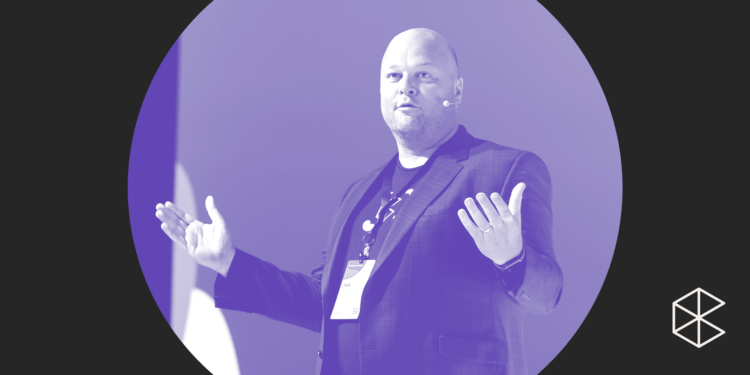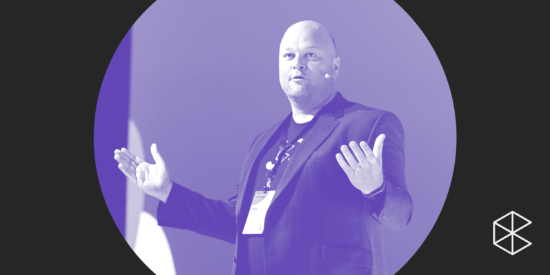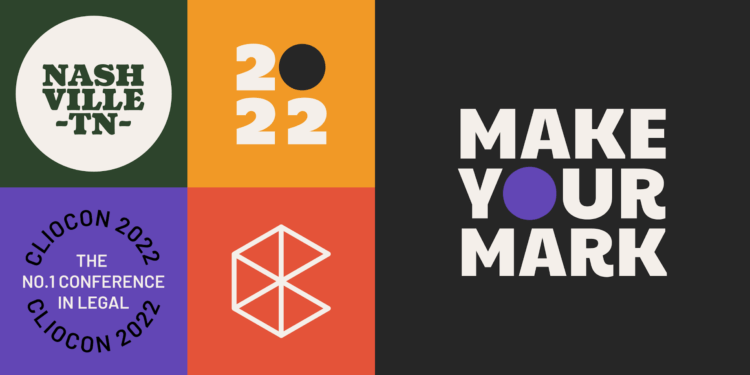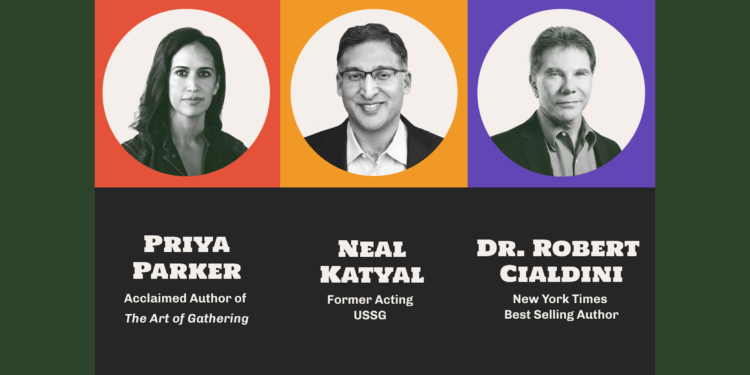The 2022 Clio Cloud Conference (ClioCon) marks our tenth annual conference, and the energy at Jack Newton’s opening keynote was palpable. With over 2,000 in-person attendees and over 1,000 tuning in virtually, we shattered ClioCon attendance records—a remarkable achievement for the first-ever hybrid ClioCon.
This year, Clio CEO and Founder Jack Newton delivered an inspiring keynote covering Clio’s vision for the future of legal services. Read on for highlights from this monumental presentation.
Celebrating where it all started
This year, Clio celebrates the 10th anniversary of the best conference in legal. So, naturally, Jack opened his keynote with a nod to 2013, reflecting on the first-ever ClioCon and how far the company has come.
A decade ago, Clio was a 70-person team. Now, 900 Clions are supporting legal professionals worldwide and transforming the legal experience for all.
While much has changed over the past decade, Jack explained that ClioCon is still about coming together to imagine and build a better future for the practice of law.
The ClioCon community
The magic of ClioCon is the community built and fostered by attendees long after the conference ends. Legal professionals have gathered at ClioCon for 10 years, creating special bonds that wouldn’t exist otherwise. As Jack noted, the next two days are a celebration of this community and its ongoing commitment to supporting one another and pushing the legal industry forward.
You may like these posts
Industry trends over the past two years
While the disruption in operations at the beginning of 2020 shattered many businesses, some standout law firms pivoted and thrived. So, what did these resilient firms have in common? They are antifragile law firms.
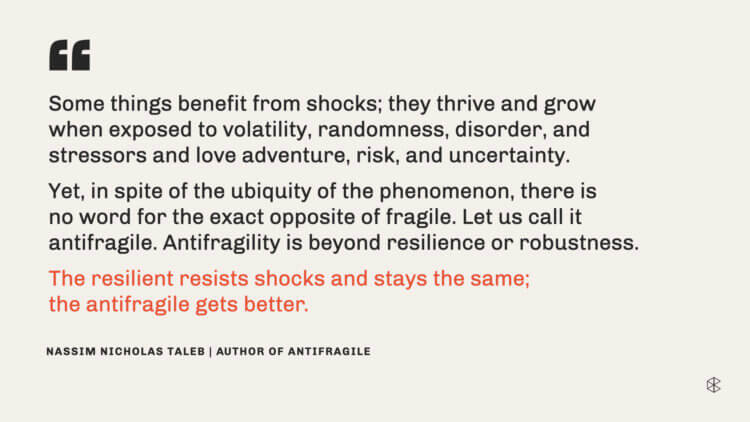
The phenomenon of antifragility
Antifragile law firms adapt, get stronger, and thrive after facing business-related adversities. More specifically, the way law firms respond to stressors can be a source of competitive advantage. So, how can law firms successfully respond to adversity?
In his book, Antifragile: Things That Gain from Disorder, Nassim Nicholas Taleb describes those that thrive under stressors as “antifragile,” or being in the category of things that not only gain from chaos but need it to survive and flourish.
Jack explained how Taleb’s philosophy beautifully articulates the law firms we see succeed in the face of hardship. While it might be antithetical to how the legal industry has traditionally operated, forward-thinking lawyers, many of whom attend ClioCon, want to change how law is practiced.
“In an ever-changing legal environment, it’s critical for firms to become antifragile.” – Jack Newton, Clio Founder
What is an anti-fragile law firm?
The antifragile law firm is one that is protected from prediction errors, market volatility, and adverse events. In short, if your law firm is well-positioned to embrace unexpected change, it will not only survive but thrive in times of uncertainty.
The Building Blocks of an Antifragile Law Firm
As Jack explained, firms exposed to stressors are actually in a unique position to evolve and thrive in a way they otherwise wouldn’t have. These law firms could save time and money if a framework existed to help smooth the process of change. Lawyers must build their firms in a resilient way to survive changing business and societal climates. These insights led to the development of our guide to support solo attorneys and small law firms: The Building Blocks of an Antifragile Law Firm.
Modern law firms should be antifragile and client-centered
While The Building Blocks of an Antifragile Law Firm builds off of the work of Nassim Nicholas Taleb, there are many important connections to Jack Newton’s book, The Client-Centered Law Firm. Both frameworks provide lawyers with winning strategies for today’s complex business and legal climate, encouraging law firms to put clients at the center of their decision-making and remain open to change.
Moreover, these frameworks support law firms dealing with disruptive stressors in today’s world, including:
- Shifting client expectations.
- An ongoing global pandemic.
- A looming recession.
- Substantial regulatory reform.
When it comes to being client-centered, no one exhibits this framework better than the Daswani Law Company (DLC), the Reisman Award Winner for Excellence in Client Service. The DLC goes above and beyond what is expected from a traditional law firm. They’re an approachable and personable team that works hard to meet the needs of their clients.
3 pillars of the antifragile law firm framework
As Jack explained, Netflix, Amazon, and Uber, among others, have exponentially raised the bar in terms of what customers can expect from their service providers. Legal clients are no different. Consumers expect a quick delivery of services (including legal services) wherever they are. Law firms who don’t offer frictionless services with intuitive onboarding, billing, and payment steps will fall behind.
Today’s law firms require an antifragile framework to avoid being leapfrogged by the changing competitive landscape. Jack went on to unpack the idea of what it means to be an antifragile law firm by identifying three key pillars:
Connection
What do transformative connections look like? This will vary depending on your practice area, geographic location, and other factors.
What we know to be universal: Lawyers need community and connection to succeed. Connections are essential to charting a path forward and building an antifragile law firm. Finding ways to build and reinforce these bonds with colleagues is essential for any law firm to develop to their full potential—but these bonds also exist between lawyers and clients.
For example, lawyers engage with clients throughout their entire legal journey. At every stage, you can encounter stressors and need to be ready to respond to them. Taking a client-centered approach is at the heart of connection. Understand what your clients want by building deep empathy for and knowledge of them—and then, of course, give them what they want.
As winner of the Legal Impact Reisman Award, Chartier & Nyamfukudza, P.L.C, understands the importance of creating meaningful connections with clients. They are firm believers in criminal justice reformation and see it as their responsibility to defend those who are labeled as indefensible. As stated on their website: The most important part of every case is working to help the client get his or her life back free from the government’s accusations and intrusions.
Their commitment to developing these connections helped them exonerate three individuals in the last year alone. Clio is honored to have such passionate and accomplished customers. Learn more about the Reisman Awards and how you can submit your firm for consideration in the 2023 Reisman Awards.
Creativity
In order to run a successful, antifragile law firm, lawyers need to embrace their creativity. This means being willing to look at established systems to find opportunities to improve. It also means looking to the future and asking “what could be” rather than accepting “what is.” Whether your firm has existed for decades or whether you’re about to open up a solo practice, it’s never too early—or too late—to question the status quo.
Technology
The rise of cloud-based technology is a game changer for law firms. Technology provides a strong foundation for antifragile law firms.
Being a great lawyer and knowing the law isn’t enough: Law firm owners and legal professionals need to run an efficient business while providing a good client experience too. The impact law firms have is profound, but lawyers have a lot on their plate and are already doing everything they can to keep up.
It’s not about simply doing more—it’s about finding solutions that allow law firms to do more with what they already have.
Data from the 2022 Legal Trends Report showed that law firms who use practice management software were 33% more satisfied with the relationship they had with their clients, 24% more satisfied with their relationships with colleagues, and 15% more satisfied with their personal lives.
As legal professionals continue to expand the range of solutions offered at their firms, they must find ways to adapt their existing systems and processes. This is where it’s important to be proactively selective about which solutions to invest in.
Antifragile law firms should be agile, flexible, and innovative
In his opening remarks, Jack asked: “When you think of the future of law firms, what do you see?”
- Agility: Firms that are set up to succeed amongst changing needs.
- Flexibility: The ability to survive when things don’t go according to plan.
- Innovation: Embracing creativity and trying new things, even if they don’t work out the first time.
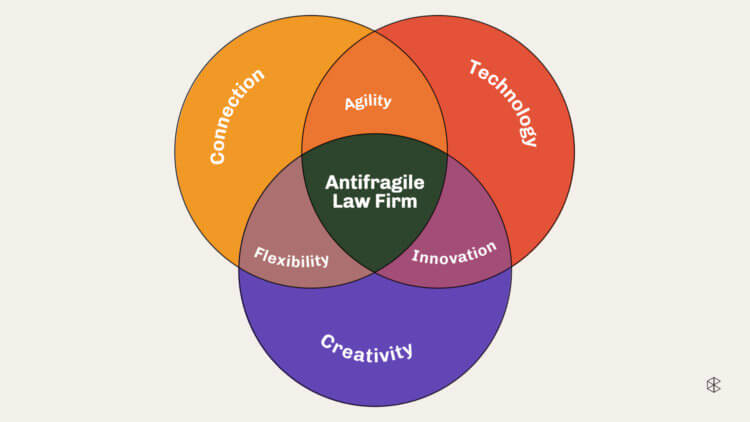
Jack explained that the goal of the antifragile law firm framework is to help law firms minimize single points of failure: “The more you can do this, the more you will thrive in uncertainty.”
An example of this is Torrey Pines Law Group, Best Growth Story Reisman Award winner. Kevin Buckley, an international patent attorney focusing on biotechnology, pharmaceutical, medical device, and artificial intelligence innovations, helped clients see the big picture and eliminate single points of failure in the process. He saw an opportunity to not just help clients bring their therapeutics, diagnostics, and other technologies to market to help solve the pandemic, but also to expand their impact into other healthcare areas. These areas include cancer, immunological conditions, and preventable diseases. In doing so, he expanded both his clients’ opportunities and grew his firm from a patent shop with four staff members to a 22-member firm with three practice areas.
Jack encouraged attendees to break out of habitual ways of thinking that can otherwise hinder growth, profitability, and the ability to make a difference.
Legal innovation
Innovation makes you unique and marketable in a way that no one else can be.
“Innovation is all about weighing, balancing, and identifying what risks you’re comfortable taking on. Innovation is the lever that will make your business profitable and grow. Innovation becomes your differentiator.” – Jack Newton, Clio Founder
Koenig|Dunne, the Law Firm Innovation Reisman Award Winner, is a shining example of innovation. Forming a committee of team members, they met with legal aid and the Nebraska Volunteer Lawyer Project to study current trends in the legal profession over a period of two years to uncover and identify access to justice gaps. Right before the pandemic hit, they launched Untie Online—the first and only online limited-scope divorce service in Nebraska. By maximizing technology to innovate how legal services are delivered, they developed an online platform to increase access to affordable divorce legal services in all counties in Nebraska, including 12 counties with no lawyers.
402 Legal, winner of the Reisman Diversity & Inclusion award, is another firm leveraging innovation to provide a competitive advantage and better client-centered experience. 402 Legal is an Omaha-based business, family, and immigration law firm offering professional services that are client-centered, results-oriented, and cost-effective. The firm’s commitment to maintaining a high standard of ethics and professionalism is the foundation of established relationships with clients and the community. They offer the sophistication and resources commonly associated with larger law firms with the personalized attention and accessibility of a small law firm.
The power of influence
Innovation doesn’t work in a vacuum—you need others to buy into your solution for it to be successful. Jack explained that creativity and innovation involve rocking the boat. The norm is not good enough. So, what else is possible? Can we get the buy-in and can we make our grand ideas a reality?
Influence is about being able to persuade others to buy into your idea or vision—persuading them that things can and should be done differently. It’s essential to bring creative ideas from the conceptual stage all the way through to reality.
Creedon Law PLLC, our Community Champion Reisman Award winner, understands the power of influence. In October 2021, Creedon Law PLLC joined Conscious Capitalism Dallas and launched their One Future initiative, donating 5% of gross revenues to Good Works, 2.5% of company time to service projects in the community, and another 2.5% of company time to pro-bono legal services. Through this initiative, they’ve helped transition homeless families out of poverty and provide children with long-term programs as they grow and their needs change.
They’ve also offset their carbon footprint, helped nonprofits expand their reach, and support global communities on the path toward sustainability and economic success. As a result, Creedon Law PLLC is the first B Corp certified law firm in Texas. By leveraging the right mindset, they’re not only driving innovation in their own firm, but also influencing the broader legal industry to become a part of the change they want to see.
The need for flexibility
Jack went on to talk about how the great resignation has hit legal. Nearly one in five lawyers have left a job in the past year and another 9% are planning to leave within the next six months.
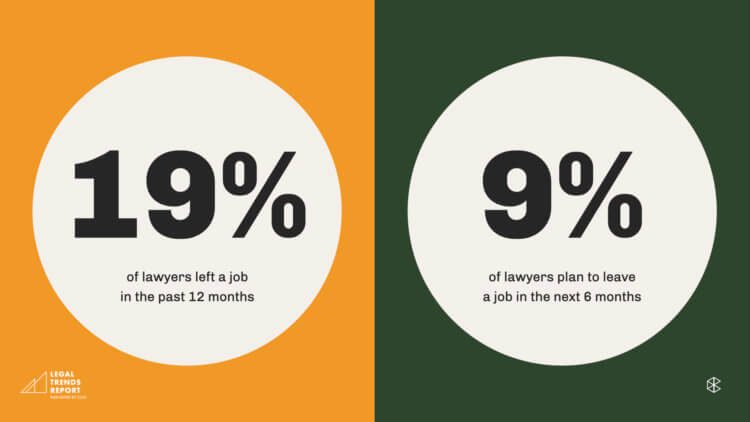
Interestingly, dissatisfaction with work-life balance held equal weight with salary dissatisfaction. Closely behind was a dislike for one’s company or manager. This is a big shift that illustrates the role law firm culture plays in the hiring and retention of employees. Much of this could be attributed to the stressors triggered by the COVID-19 pandemic.
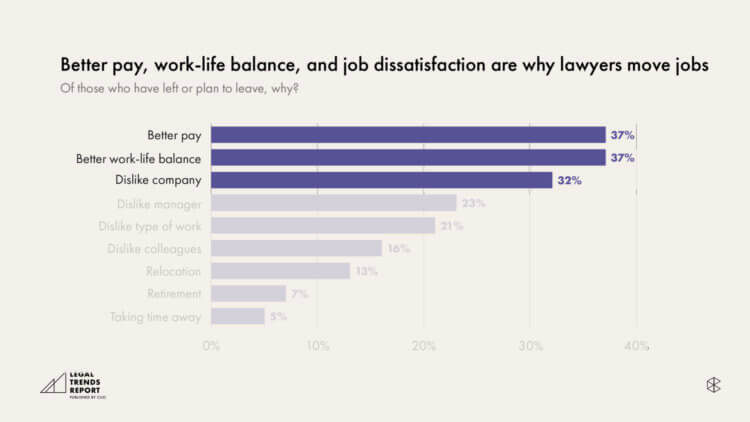
Jack referred to these results as a rallying cry to create work environments that support legal professionals’ well being.
How can we do that?
One way is to provide legal professionals with the flexibility to work on their own terms. Seventy-six percent of lawyers want to be able to choose the hours they work. The legal industry must accept that attracting and retaining top talent is not solely about providing top pay, it’s also about creating a law firm culture that reflects the needs of clients and colleagues.
Antifragile legal technology
Jack pointed out that Clio customers have the upper hand in the legal industry. While it’s one thing to innovate and become antifragile through one’s own actions, firms also need the right legal technology to support them on their journey. We’re always thinking about what the future holds and how we can help lawyers build better firms. Clio customers have a tech stack that will support them in becoming future-proof, antifragile law firms.
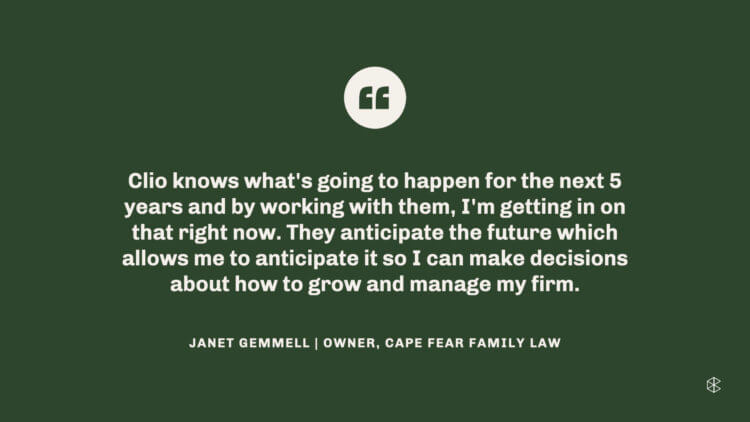
Being flexible enough to pivot and meet growing changes is imperative to being antifragile. And our Best New Law Firm Reisman Award Winner, Rudder Law Group, knows this well. Rudder Law Group provides high quality legal services at a fraction of the cost of big law firms. They specialize in assisting clients with the environmental review and permitting processes.
Supporting Clio customers
We know how incredibly hard our customers work, and we know that many work non-traditional hours, outside of 9-to-5. That’s why Clio offers 24/5 support, available by phone, email, and directly through Clio software.
Our support team assisted customers over 143,000 times this past year. Whether customers wanted to talk about new ideas, ask for advice needed on a new process, or simply explore Clio together, our support team was there for them with an average response time of just one minute and 32 seconds.
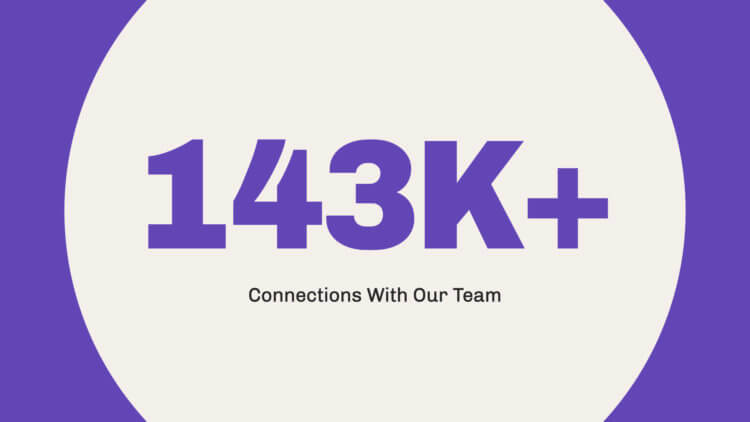
Based on customer feedback, we’ve launched a reimagined help center experience. Now, Clio users can navigate more easily within our search and support articles. We’ve also added more intuitive articles to help answer questions quickly along with even more video tutorials.
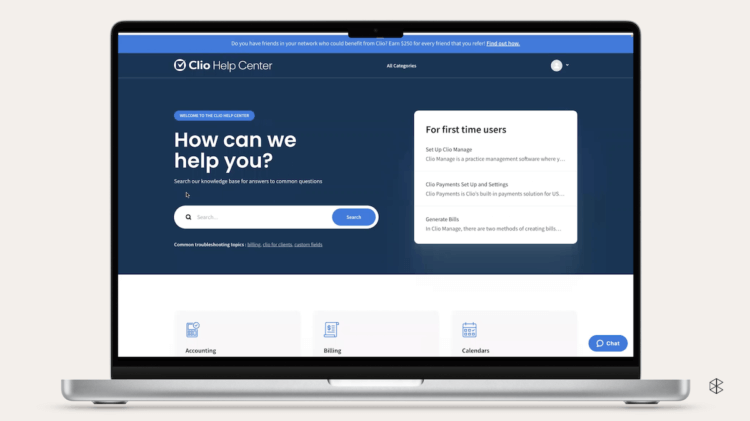
Success and security
When you place your trust in Clio, you get a dedicated team of 17 in-house security professionals to support you. Our security team has implemented a behavioral detection system that uses heuristics to investigate billions of data points detecting suspicious activity and alerting our team before it’s too late. In other words, our team can tell if someone other than you is trying to log into your account. And if that happens, our team will notify you immediately and work with you to rectify the situation.
We’re also proud to report that we recently completed an external audit and are now compliant with the System and Organization Controls Standard 2 (SOC 2). SOC 2 is developed and overseen by the American Institute of Certified Public Accountants and is the standard for secure business practices and protection of customer data.
Lastly, we’ve completed an internal Health Insurance Portability and Accountability Act (HIPAA) attestation examination. This means Clio customers have the option to store and process protected health information in a HIPAA-compliant manner using Clio.
Enhancing the client journey
Clients are looking for signals that you are flexible and able to meet them where they’re at. With this in mind, Jack announced a number of new Clio features centered around enhancing the client experience.
Clio Grow websites
Prospective clients want quick, easy ways to learn more about your law firm and decide whether they want to work with you. Clio Grow users can now build a professional, single-page website to put their best foot forward with prospective clients using Clio Grow websites. As Jack noted, your Clio Grow website can function as your “Link in Bio” for seamless social discovery while providing prospective clients with an easy way to find, book, and pay for their consultation.
Available for all subscriptions.
Text messaging
Clio customers now have the ability to text with clients—without sharing their personal phone number. With this feature, customers can set up text reminders for important events, and clients can text photos, files, and GIFs. What’s more, your text messages are saved in Clio Manage, so you can keep track of important conversations and updates.
Available for Clio Manage customers.
Clio for Clients
Since its launch last year, Clio for Clients has become an incredibly popular app. To make it more valuable, we’ve added push notifications, which provide live updates and also update your clients on their case. We’ve also added billing and payments to Clio for Clients. And very soon, clients will be able to upload documents in bulk.
Productivity
Clio’s product team has introduced a number of features to help lawyers work smarter, not harder.
Archived void and deleted bills
Our product team identified bottlenecks and streamlined processes in Clio Manage to provide continued value to customers. For example, when we look at month-end billing, users can now hide deleted and voided bills under an archive tab. Now, you can bill for time and expenses separately, which was flagged as a wish-list function specifically by our customers who bill on the contingency model. Additionally, more flexible fee reconciliation processes were added.
Available for all subscriptions.
QR codes in Clio Payments
QR codes provide Clio Payments customers even more convenient, inexpensive, and fast ways for their clients to pay—in person and online. To pay, clients can either scan a printed QR code or one embedded on a law firm’s website using their mobile device. Learn more about this feature here.
Available for Clio Payments customers.
Ready-to-fill court forms
Last year, we celebrated our acquisition of Lawyaw (now known as Clio Draft), a sophisticated document automation platform set to revolutionize the delivery of legal services by digitizing document creation for law firms. We’re thrilled to announce that Lawyaw is now available in all 50 states.
“We’re proud to say that the firms who have been able to use Lawyaw court forms have been able to complete two hours of document drafting in just 20 minutes.” – Jack Newton, Clio Founder
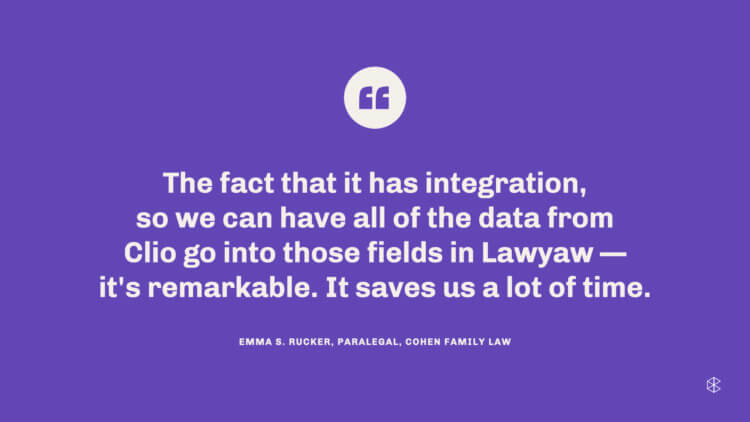
Improving legal calendaring software
During a case, one unexpected change to your “to-dos” can set up a long series of subsequent changes. To enable you to more quickly pivot when the inevitable occurs, we’ve enhanced our tasks and calendar rules features to streamline the process. Clio users can now easily drag and drop court dates across the Clio calendar. Due dates for tasks can now also be updated in bulk, saving users time along with future stress and confusion.
Clio’s connected product suite
Technology plays a significant role in improving the work experience for individuals across your firm. When they can get more done in the time they have, they feel more satisfaction in what they’ve accomplished. And, while Clio acts as a central hub, each firm runs on a variety of technologies according to their unique needs. That’s why we’re continuing to invest in the way different technologies and products integrate with one another.
Among the enhancements made to our integration suite, we’ve enabled our partners to bring the best of their solutions right into Clio. We’re excited to announce three apps who have already taken advantage of this enhancement: Fidu, Legalboards, and Proof.
- Fidu works with Clio Manage to help you automate the delivery of subscription legal services.
- Legalboards and Clio allow firms to follow matters visually, enhancing collaboration and awareness across the organization, without having to open and read each case file.
- The service of process is often highly fragmented and time consuming for legal professionals. However, with Clio and Proof, you can quickly create requests, serve court documents to contacts, and track everything in real time.
We’ve also launched a Clio Certified App program. This designation means that the app has extreme capabilities in terms of user experience, security, uptime, and customer value.
Looking for more information? Check out what’s new and improved in Clio.
The need for change in law firm culture
What you do matters, and it has a profound impact on society—but you can only do so much. Legal professionals are under more pressure than ever before with increased workloads and longer work days. This isn’t sustainable. The rate of inflation has also surpassed law firm rates for the first time, which will put economic stress on the legal industry in coming years.
The future of law is now
Together, we’re shaping the future of law. It’s time for law firms to embrace this concept and become antifragile so they can adapt to our changing environment, thrive as businesses, and best serve their clients.
We’re living in an era where technology is rapidly changing where we live and work, but it’s also creating new risks. From cybersecurity breaches to loss of privacy rights, it’s critical we build our practices to respond to these new challenges without sacrificing our values or our clients’ trust. The right technology provides the right foundation, and acts as an innovative partner for law firms.
Antifragile law firms are able to deliver good client-centered experiences long-term by creating balance between the needs of their clients, the industry, and themselves. Their innovation and sustainable mindset makes them resilient to market changes while providing them with the influence needed to set the course for the future.
Download the Antifragile Law Firm Guide now.
We published this blog post in October 2022. Last updated: .
Categorized in: Clio
